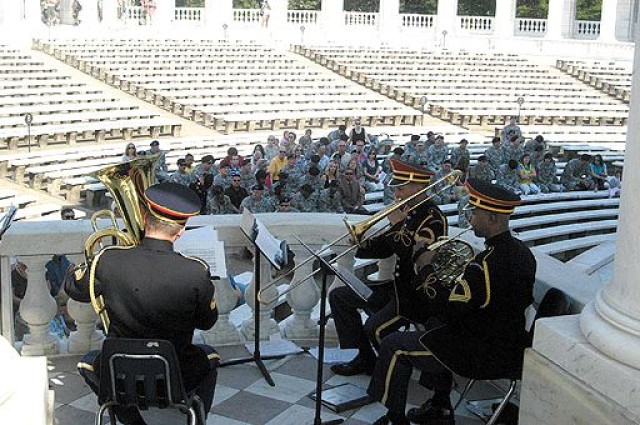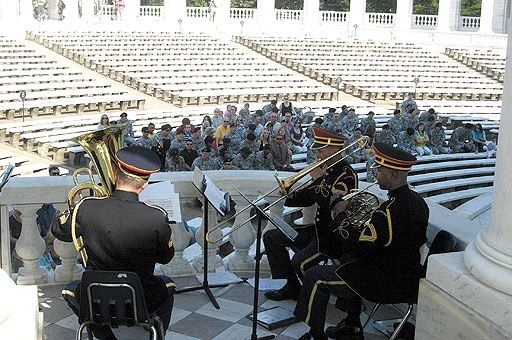Army chaplains, chaplain assistants, Family members and others from the National Capital Area gathered at Joint Base Myer-Henderson Hall's Memorial Chapel July 23 to acknowledge the 235th anniversary of the service's Chaplain Corps.
Approximately 210 people from Fort Belvoir, Fort Meade, the Walter Reed Army Medical Center and other installations gathered at the chapel July 23 taking three tour buses into Arlington National Cemetery to hear a concert by the U.S. Army Brass Quintet in Memorial Amphitheater, witness a wreath laying at the Tomb of the Unknown and watch the 3rd U.S. Infantry, (The Old Guard) changing of the guard.
The group then proceeded to an area of the cemetery known as Chaplain's Hill, in Section 2 of the cemetery where chaplains from four wars are buried, including Chap. (Col.) John T. Axton from World War I, the first Army chief of chaplains.
Chap. (Brig. Gen.) Donald L. Rutherford, deputy chief of chaplains, spoke to the assembled, explained how chaplains have made a difference in the lives of service personnel and cited the heroism of individual chaplains who died in the line of duty.
''Today we have over 900 chaplains and chaplain assistants deployed or mobilized around the world in support of current operations," he said. ''We've been all around the globe bringing God to Soldiers and Soldiers to God."
Last year's recognition honored the 100th anniversary of the chaplains' assistant position in the corps. This year's focus was the 60th anniversary of the Chaplain Corps service in the Korean War - a conflict sometimes referred to as ''the forgotten war."
Rutherford noted a special guest of the day's anniversary celebration: retired Col. Parker Campbell Thompson, a chaplain who volunteered to go to Korea days after having graduated seminary. Thompson joined the 7th Infantry Regiment of the 3rd Infantry Division and became involved in the Battle of the Boomerang. He was wounded three times during his Korean service and later went on to help write the first volume of the Chaplain Corps' history.
''It was a bloody, bloody battle," Rutherford said of the Battle of the Boomerang, ''yet God was there sustaining Soldiers and using Parker Thompson to nurture the living and care for the wounded and dying. In the middle of the worst of warfare, God gave Parker the peace that he was serving God's will and serving Soldiers best spiritual interests even in the midst of humanity's worst."
Rutherford also cited the heroics of Chap. Emil Kapaun, who served with the 8th Regiment of the 1st Cavalry in November 1950. After an attack by Communist Chinese forces, he said, ''Kapaun helped gather and protect a group of 50 wounded and would not leave them when ordered to evacuate."
''Chaplain Kapaun provides us a marvelous testimony of how to heroically care for the wounded," the deputy chief of chaplains said. ''He cared for them to the greatest degree and in return this country will honor him with its greatest of honors when he is posthumously awarded the Medal of Honor later this year or in early 2011."
Rutherford also spoke of the bravery of Chap. Herman G. Felhoelter, who served with the 19th Infantry Regiment. On July 16, 1950, Felhoelter was north of Taejon helping a group carry 30 wounded Soldiers. They came under attack and when it became apparent they could not endure the enemy assault. Felhoelter convinced the medical officer to lead all able Soldiers to safety while he remained with the wounded and dying. They were soon attacked and killed.
Felhoelter, who posthumously received the Distinguished Service Cross, ''was the first Chaplain Corps casualty in Korea, but not the last," Rutherford said. ''Today, the willingness of our branch to serve alongside our fellow Soldiers and die with them if need be, continues."
Finally, Rutherford noted the passing of Staff Sgt. Christopher T. Stout, a chaplain assistant who was killed this July 13 in Afghanistan while repelling an insurgent attack on an Afghan police compound in Kandahar.
''There are over 300,000 [chaplains] buried here in Arlington and thousands more in cemeteries in this country and around the world who we owe honor for their deepest sacrifice," said Rutherford. ''Let us pause briefly now and pay our respects in silence to [Staff Sergeant Stout and to all his fellow fallen warriors.
''In God's strength we will continue to faithfully nurture the living, care for the wounded, and honor the Dead. In God's strength we will lift the loads of Soldiers and Families. And in God's strength we will bless the lord by bringing him glory, and by continuing in our spiritual legacy of 235 years of bringing Soldiers to God and God to Soldiers."
Next Sgt. Adam Westermann, a chaplain assistant NCO with The Old Guard, sang an a cappella version of the Army chaplains' song, ''Soldiers of God," and a wreath was laid at Chaplains Hill in memory of fallen comrades.
After the solemn ceremony, the group returned to Memorial Chapel for a festive picnic with catered barbecue and rhythm and blues music provided by a four-piece combo from the Army Band, which delivered tasty rhythm and blues music, including ''Mustang Sally," ''Blue Monk," and an unusually gritty Antonio Carlos Jobim samba.
At the picnic, Joint Base Myer-Henderson Hall Chap. (Lt. Col.) Matt Woodbery welcomed guests and praised the fellowship of the gathering. ''We're here to renew old friendships and make new friends," he said.
Special guest Thompson shared stories at the picnic of several brave chaplains who perished while ministering to Soldiers. He said that during World War II, Army chaplains suffered the highest casualty rate after first infantry officers and Air Corps pilots.
''This is your heritage," Thompson told the assembled gathering. ''On behalf of those who can't salute you [and here he enumerated the numerous chaplains who died in the line of duty] ... I salute you."
''It's good to reflect on all that came before us," said Spc. Julian Butler, a chaplain assistant with Memorial Chapel and Headquarters and Headquarters Company.
Butler said his chosen career path has been rewarding beyond his expectations since joining the Chaplain Corps two years ago.
''It's better than I thought it would be. ''I've wound up helping a lot of folk," he said.
''I thought it was neat," said college student Jaclyn Warden, daughter of Chap. (Col) Robert Warden of the Chief of Chaplains Office, reflecting on her visit to Arlington Cemetery and the day's events. ''I had never seen the changing of the guard before."
''This makes you think about what you do as a chaplain," said Chap. (Maj.) Vaughn Bridges, a clinical pastoral education supervisor at Walter Reed Army Medical Center.
''I love my job. Along with being a sergeant major, being an Army chaplain is one of the best jobs in the Army. You get to go out and talk to Soldiers, get to know them and help them," he said.
Westermann, who helped organize Friday's event as well as sing at the Chaplains Hill ceremony, said the feedback organizers had received was very positive. ''People have used words like 'humbling' and 'awesome,'" he said.


Social Sharing